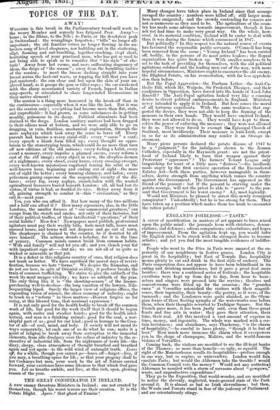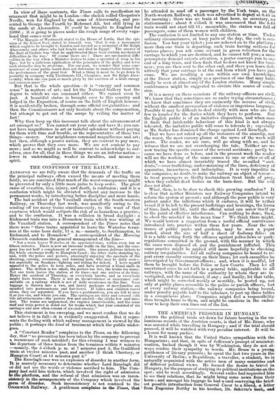ENGLAND'S FOIBLESSE—" TASTE."
A SENSE of mortification in matters of art appears to have seized upon the public mind : the journals teem with strictures, denun- ciations, and defences ; odious comparisons, exhortations, and hopes of improvement. From the agitation kept up,you would infer the English mind to be struck with the strongest desire to become artistic ; and yet you find the most tangible evidences of indiffer- ence.
People who went to the fetes in Paris were amazed at the su- periority of our neighbours in festive graces. London City is great in its hospitality ; but East of Temple Bar, hospitality means plenty to eat and drink in the first style of cookery. The Paris corporation does not appear to have been behindhand in its eating and drinking munificenees, but it gave a great deal more besides : there was a continued series of festivals ; the hospitable exertions were kept up from day to day, from hour to hour : actors and singers were pressed into the service ; theatres and concert-rooms were fitted up for the occasion ; the " grandes eaux " at Versailles astonished the visitors with their magnifi- cence, their ingenuity, their beauty—the poetry, as it were, of the turncock ; and the Londoners were quite abashed, as the Olym- pian forms of those fleeting nymphs of the waterworks rose before them, when their thoughts reverted to Trafalgar Square. But the French gave more, it has been justly said, even than these great feasts and fine arts in water : they gave their attention, their time, their zeal. All this involved a vast amount of expense in time, money, and ingenuity. The whole was marked with a cer- tain lavishness ; and abundance, says Thackeray, "is the charm of hospitality,"—be careful to have plenty, " though it be but of beer." How much more immense the charm when it overpowers you in the shape of champagne, Moliere, and the world-famous visions of Versailles.
Coming back, the visitors are mortified to see the ill-kept banks of the Thames ; so more than homely—so ugly, so squalid. The sight of the Mansionhouse recalls its hospitalities—profuse enough in one way, but so supine, so uninventive. London would fain emulate Paris ; but would the Aldermen take the trouble ? would the Common Council vote the money ? Would not any testhetical Alderman be assailed with a storm of sarcasms about " gewgaws," waste, and unproductive expenditure ? They go to the Exposition, that world-wonder, and are mortified to notice the slovenly, neglected, waste-ground state of the Park around it. It is almost as bad as Irish slovenliness : but then, the Woods and Forests stand in fear of the jealousy of Parliament and are ostentatiously stingy. In view of these-contrasts; the- limes calls to recolleationean ornament that Might be in London—the obelisk called Cleopatra's Needle, won for Vngland by the arms of Ahercromby, and pre- sented George the Fourth by Mehemet Ali, but still lying in the sands at Alexandria. It could be brought to England for 25001. • it is going tp pieces under the rough usage of every vaga- bond that comes near it.
" The Marquis of Westmeath stated to the House of Lords, that the opi- nion of Sir Robert Peel, stated to himself, was, 'that it was a monument which ought to be brought to London and erected as a memorial of Sir Ralph Abercrom%y and others who had fought and died in Egypt.' The answer of the Earl of Carlisle was 'that he apprehended there were certain mechanical difficulties in the way.' Of course there are ! There are mechanical diffi- culties in the way when a Minister desires to raise a spoonful of soup to his lips ; but by a judicious application of the principles of the pulley and lever such obstacles may be oVercome. For our part, we wonder that some com- missioner of some public board does not determine to immortalize himself by the performance of the great feat. What a thing it must be to go down to posterity in company with Thothmosis III., Cleopatra, and Sir Ralph Aber- cromby, when one can gain so much glory by the exertion of a little energy and common sense !"
Bat that is the whole question—it is "energy and common sense" in matters of art ; and let the National Gallery test the degree to which we can command either. We cannot even be just. A beautiful statue is brought over to this country and lodged in the Exposition, of course on the faith of English honour ; it is accidentally broken, through some official irregularities ; and then the Commissioners not only hesitate about the compensation, but attempt to get out of the scrape by veiling the matter of fact !
Why then keep up this incessant talk about the advancement of art amongst us? You cannot eat your cake and have it; you can- not have magnificence in art or tasteful splendour without paying for them with time and trouble, or the representative of those two things—money. Our neighbours command magnificence and art; but then, although a poorer nation, they are content to pay more, which proves that they care more. We are not content to pay more ; and so we might as well be content to acknowledge to our- selves, once for all, that in those things we are an inferior nation— lower in understanding, weaker in faculties, and meaner in spirit.



























 Previous page
Previous page